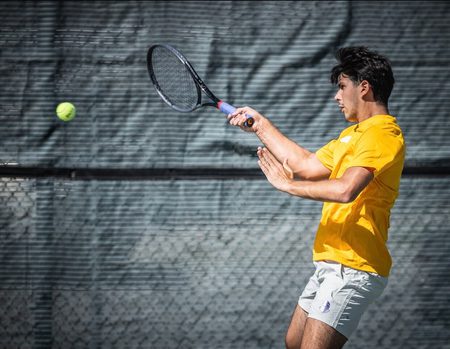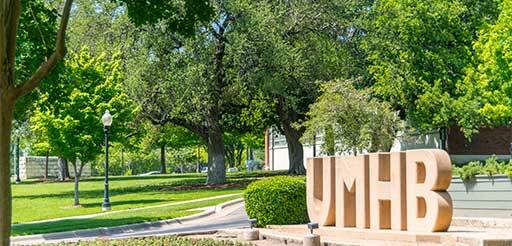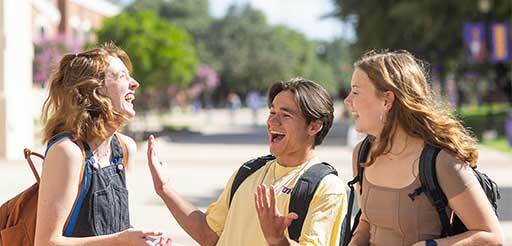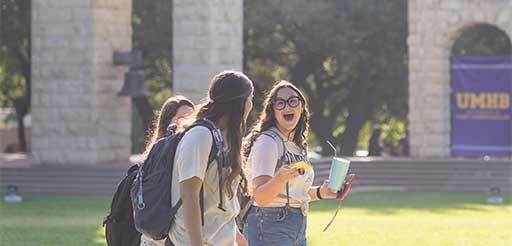By Kate Myles, COMM 3365
Attending college as a student-athlete is a learning experience for young and growing adults to start their athletic careers and be on their own away from home. For some, it means being an entire country, or even a continent away.
One of these student-athletes is tennis player Joaquim Fernandes, a junior from Rio de Janeiro, Brazil. He is one of over 24,000 student-athletes enrolled and competing at NCAA schools, according to the organization’s statistical data. Within Division Three tennis, he is one of just 286 males.
While most student-athletes may see their families at games or are able to make a visit home from time to time, the distance makes it extremely difficult to be able to travel home during semesters. “Being homesick is natural, and you just learn how to live with it. I talk to my parents and friends from back home almost every day, so that is super helpful,” Fernandes said.
Another international student-athlete is Mathis Rollin, a member of UMHB’s Men’s Golf team hailing from Ontario, Canada. He is one of 82 international men’s golfers competing at the Division III level.
Rollin, now in his third year at UMHB, has made his mark during his time here, being a core member of the team in UMHB’s Human Performance Lab. “You really are building a resume and you don’t know what opportunities might come next,” Rollin said.
Another one of the 286 international male tennis players in Division III is Ignacio Rubio, a native of Antofagasta, Chile. He is a transfer from Southwestern College in Kansas. “Being at a different college in the United States before coming to UMHB helped me get used to how life is here,” Rubio said.
A challenge that international students face is navigating potential language barriers. Liana Petrova, a Bethune-Cookman University graduate with a master’s degree in media communication, has firsthand experience with how a language barrier can impact students. 'Language gaps can be tricky and can lead to more complications than expected, including not understanding casual phrases or slang terms,' Petrova says.
Rubio talks about how language barriers can cause difficulty for him on a day-to-day basis. “There is always a language barrier, no matter how large or how small. I have been here for two and a half years and it’s still difficult sometimes,” he said. He also spoke on how people have been a good support system for him as well.
“My native language is not English but finding good people that understand those difficulties and help you feel comfortable with your second language is a breath of fresh air. It’s been helpful to find other native Spanish speakers since it feels more natural to me,” Rubio said.
When it comes to that barrier, Fernandes has had minimal changes with it. “Of course, I don’t speak the same way an American does, but I really do understand everything, and even if I don’t know a specific word meaning, I just ask,” he said.
Rollin has a different take on the concept, with his primary language being French. “I had never been to a fully English school before I came here, and that was an adjustment for sure. However, I spoke pretty good language before that, so it wasn’t much of an issue,” he said.
“What is still hard to this day is that I never get to speak French here except when I am on the phone with my family and friends. There was also some slang and terminology that I had to get used to but once you know them you understand it and start using it subconsciously,” he said.
The recruiting process for a student-athlete depends on the situation. It could be anything from an email, interpersonal connections, or even the transfer portal. According to the Next College Student Athlete Association, the best way for international recruits to connect with a coach is by sending them a personalized email with all of your information and statistics regarding that sport.
Rollin was searching for schools to play golf at in the collegiate level. One of these searches put UMHB on the board for him. “I quite literally just looked up ‘Best Division III golf school’ or something similar and UMHB came up on that list. I emailed coach Jordan Cox and after one call, offered me a spot. Now here I am in my sixth semester,” he said.
For Rubio, he had some connections that were a good resource for him to come to UMHB. “I contacted Coach (Daniel) White via email because a good friend of mine was on the team too at the time. It made it easier to have the personal connection to get in contact with the coach,” he said.
Sometimes things happen the way they’re supposed to naturally, and Fernandes is an example of that when it comes to arriving at UMHB. “Coach White found me in the transfer portal. Before coming here, I was at Luther College, another Division III school in Iowa. I wanted to transfer because they didn’t have an engineering major offered there, so I got into the transfer portal and coach reached out to me,” he said.
All three athletes talk about what they would share with other student-athletes about the experience.
Rollin encourages anyone considering studying abroad as a student-athlete to take the leap of courage and do it. “I would totally recommend it. My advice would be to get involved as much as possible. I never knew how many cool opportunities I would be brought when I came here,” he said.
Fernandes recognizes the struggle some may have been incredibly far from home. “The advice I would give to any international student-athlete is that being far from your family will be the hardest challenge for sure. If you are not prepared for that, then maybe you shouldn’t study abroad. If it won’t be a problem, however, it will be worth it,” he said.
Rubio also speaks highly of the experience. “Get to know people and their cultures, enjoy every single moment, and remember that even though it’s hard, it’s a once in a lifetime experience that not everyone gets to do,” he said.
It takes an impressive amount of courage, strength, and passion to take your education and athletic career to a different level. Getting to know these unique stories puts a whole new meaning on the definition of the life of a student-athlete as we know it.




